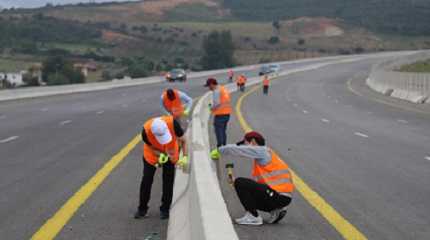
ALGIERS, July 17 (Xinhua) -- Despite the blistering sunshine in July, the construction site of the East-West Highway in Algeria's easternmost province of El Tarf is buzzing with activity.
Chinese and Algerian workers are braving the extreme heat, busy laying asphalt and making final preparations for the opening of the road to traffic.
"The section holds pivotal importance because its opening signifies the full completion of the 1,216-km-long East-West Highway, which connects 17 Algerian provinces and brings the country closer to other Arab countries," Djotni Benaissa, head of the highway project at Algeria's National Highway Agency, told Xinhua in an interview.
The East-West Highway, crossing from Algeria's eastern border with Tunisia to the western border with Morocco, is considered one of the country's most important projects.
In November 2017, Algeria inked a deal with the China International Trust and Investment Corp. (CITIC) to finalize the remaining 84 km eastern section of the highway near the Tunisian border, about three years after it was abandoned by the initial Japanese contractor over payments disputes.
CITIC Construction, which used to build other sections of the East-West Highway, was selected as the succeeding contractor of the project thanks to its previous remarkable performance.
Mohamed Khaldi, director of the agency, hailed CITIC Construction for "its adherence to local laws and regulations and international norms during its previous construction work of the highway," adding that the company has implemented "advanced technology to ensure high standards and quality of the project."
The construction process has overcome numerous challenges due to the complex terrain and geological conditions.
"In Europe, a roadbed fill with a height of more than 5 meters is considered high. In this project, the fill reaches 44.7 meters at the highest," said Ji Zongli, the project's chief engineer, when elaborating on their difficulties.
"The soil is predominantly marl, which will turn into mud when wet," Ji added, calling it a disaster for engineers.
In early summer this year, El Tarf experienced unusually heavy rainfall that lasted for over a month, posing great challenges to the construction work.
"Although the inclement weather disrupted work plans and significantly affected the project's progress, CITIC Construction persisted so as to finalize the project before the deadline," said Ait Mahmoud, an Algerian geologist.
Besides, the company has assisted Algeria in cultivating talents. Over the past years, it has offered technical training to 16,000 Algerian engineers, said Qi Shujie, the deputy general manager of CITIC Construction Algeria.
Larbaoui Mohammed, whose Chinese name is A Bao, is a representative of those young engineers. He joined CITIC in 2008 after graduation and has got promoted to project manager.
"Thanks to the opportunity provided by CITIC Construction, I have gained extensive knowledge and managed to buy a house and a car by myself," he said.
"Young Algerian engineers, who have accumulated experience through long-term cooperation with their Chinese colleagues, are highly skilled and represent the future of the industry in Algeria," said Mohamed Salah Kafi, the head of the eastern region bureau of Algeria's National Highway Agency.




